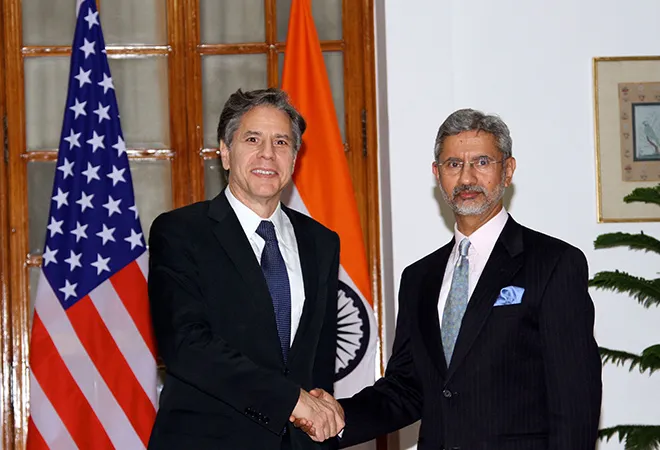-
CENTRES
Progammes & Centres
Location
Blinken’s record as a clear-eyed internationalist could inform a pragmatic US policy towards India.

This week, US President-elect Joe Biden announced nominations for his foreign policy and national security cabinet posts. In a series of firsts, former Deputy Director of Homeland Security Alejandro Mayorkas will be the first Latino to lead that department, and former Deputy CIA Director Avril Haines will be the first woman to serve as Director of National Intelligence. In addition, Jake Sullivan, who served as National Security Advisor to Vice President Biden will reportedly “take on the same title — but now to a President Biden.” For US ambassador to the UN, Biden has picked Linda Thomas-Greenfield, a career diplomat who will be the second African American woman to represent Washington at the global high-table.
From a foreign policy standpoint however, the most significant nomination was that of Antony Blinken for US Secretary of State. Blinken has been National Security Adviser (2009-13) to Vice President Biden, Deputy National Security Advisor (2013-15) to President Barack Obama, and even Deputy Secretary of State (2015-17). With his three-decade career in Democratic national security circles, Blinken is believed to be so close to Biden, that some view him as the president-elect’s “alter ego.” However, Biden’s decision to have one of his closest confidants as America’s top diplomat also seems to be a very calculated one.
From a political standpoint, as with Biden’s decision to pick Kamala Harris as his vice president, Blinken’s nomination conveys Biden’s firm hold over his policy agenda — defying pre-election assessments over a possible takeover of Biden’s cabinet (and thereby his policy agenda) by progressives of the Democratic Party. Beyond intra-party tussles, picking Blinken also pertains to presenting a familiar national security profile that Republicans can get behind, since Biden would need across-the-aisle support to confirm cabinet nominations in a closely-divided US Senate.
In addition, the nomination of State Department veteran Blinken conveys Biden’s intent to put career professionals front-and-centre in foreign policy decision-making. This would follow four years of President Donald Trump either personalising US foreign policy or centralising it at the National Security Council. Not to mention, a discouraged cadre of career diplomats and foreign service officers after a period of being treated with “distrust and disdain” by Trump officials like Secretary of State Rex Tillerson, who also oversaw the departure of senior leadership from the Foggy Bottom. Whereas, with respect to America’s allies, Biden may be looking to convey the “predictability of our
Furthermore, a dwindling appetite for US internationalism has increasingly been evident, particularly with rising opposition to US military adventurism — with Republicans and Democrats both doing so under similar terminologies of “endless wars” and “forever wars”. Here, Blinken’s nomination offers a centrist proposition, which prioritises US advocacy of democratic values but in recognition of limits of US power.
Blinken is most certainly a liberal interventionist i.e. an outspoken advocate of America’s role as the vanguard for democratic values and human rights.
Blinken is most certainly a liberal interventionist i.e. an outspoken advocate of America’s role as the vanguard for democratic values and human rights. Recently, Obama’s memoir even added credence to that assessment, with its section on his team’s internal deliberations on the Arab Spring. On the question of supporting the democratic uprising in Egypt, Obama recalls Blinken and some advisors to have been convinced that Hosni Mubarak had “fully and irretrievably lost his legitimacy with the Egyptian people.” Whereas, Blinken’s boss, Biden was part of a small majority of officials who “counseled caution” against ditching a long-standing US partner.
On the other hand, evidence suggests that Blinken’s advocacy for US stewardship doesn't render him to be a cock-eyed believer in the US military being capable of tackling all kinds of foreign policy challenges. Former Secretary of Defence Robert Gates’ memoir for instance, recounts the Obama administration’s internal policy deliberation on Afghanistan. In pushing for a limited counterterrorism-focused strategy, a small minority of officials (represented by Biden and Blinken) convinced Obama to not completely follow then-ISAF Commander General Stanley McChrystal’s prescription for an expansive, military-led counterinsurgency effort.
In fact, Blinken has also been known for his unapologetic acknowledgment of the limits of American power. On the proposition of America arming Ukrainians against Russia, Blinken had expressed doubt: “Even if assistance were to go to Ukraine, that is very unlikely to change Russia’s calculus or prevent an invasion.” Interestingly, Blinken’s pragmatic outlook goes both ways i.e. to also refute an expansive understanding of the effects of American inaction. In face of Republican criticism of heightened Russian aggression in Ukraine supposedly being the result of Obama’s inaction in Syria, Blinken famously said: “This is not about what we do or we say in the first instance, it’s about Russia and its perceived interests.”
Most assessments already predict a considerable degree of continuity on US-India ties under a Biden administration. The reasons for which however, go beyond Biden already being acquainted with the Narendra Modi dispensation in New Delhi. More importantly, Biden played a central role in America’s strategic courtship of India. For instance, in early 2000s, Biden co-sponsored a legislation (Naval Vessels Transfer Act of 2005) which led to India’s acquisition of the first US-built warship, and even oversaw the passage of the US-India Civil Nuclear Agreement as chairman of the Senate Foreign Relations Committee.
Blinken as US Secretary of State won’t be a stranger to Biden’s foundational role in the modern-day development of America’s ties with India. In fact, Blinken experienced that first-hand since he then served as Biden’s staff director on the Senate Foreign Relations Committee.
Blinken as US Secretary of State won’t be a stranger to Biden’s foundational role in the modern-day development of America’s ties with India. In fact, Blinken experienced that first-hand since he then served as Biden’s staff director on the Senate Foreign Relations Committee. In a sign of that experience being central to his current assessment of the US-India bilateral relationship, at an event in Washington DC early this year, Blinken recalled Biden’s early role and deemed it to have been important in “solidifying our
Going forward, there would be scope for Blinken to further develop America’s ties with India, given Trump’s continuity on the Obama years’ work on the US-India portfolio. For instance, at the event referenced earlier, Blinken touted two achievements of the Obama years to underscore Biden’s commitment on US-India ties. They were, designation of India as a ‘Major Defence Partner’ and the US-India Defence Technology and Trade Initiative (DTTI). The Trump administration only furthered these avenues by also classifying India under the Strategic Trade Authorisation-1 category (as only the third Asian nation to get that status) and finalising the Industrial Security Annex (a crucial precursor for the actualisation of DTTI).
Ahead of the election, Blinken likely limited his criticism of Trump’s record on India, to being unnecessarily replete with “photo-ops” and a transactional outlook prevailing on trade. Hence, given the avenues where Blinken could build on Trump’s record, his priorities on India would be slightly different from the restorationist agenda he is expected to adopt towards other US partners.
One aspect where Blinken would surely depart from the Trump record, pertains to being more vocal with apprehensions over some Indian domestic policies. Given his discussed record on being an advocate for democratic values and human rights, Blinken has already alluded to there being “real concerns” over India “cracking down on freedom of movement and freedom of speech in Kashmir,
The effort to not have those “differences” impede larger US interests with India, is also reflected in Blinken’s reported receptiveness to instead construe US-China ties on ideological lines. Whereby, Blinken has identified Trump’s apparent “signals of impunity” on Beijing’s human rights record, as a major reason behind the US now finding itself in a “strategic deficit.” In Blinken’s effort to now have the US remerge “in a position of strength from which to engage China”, he has notably invoked Trump’s ‘Indo-Pacific’ construct to call on India to be “a key partner in that effort.”
Hence, while Blinken’s record as a clear-eyed internationalist makes him well-suited for Biden’s agenda to “reclaim America's seat at the head of the table”, in case of India, it could also inform a pragmatic approach to further develop US-India ties.
The views expressed above belong to the author(s). ORF research and analyses now available on Telegram! Click here to access our curated content — blogs, longforms and interviews.

Kashish Parpiani is Senior Manager (Chairman’s Office), Reliance Industries Limited (RIL). He is a former Fellow, ORF, Mumbai. ...
Read More +